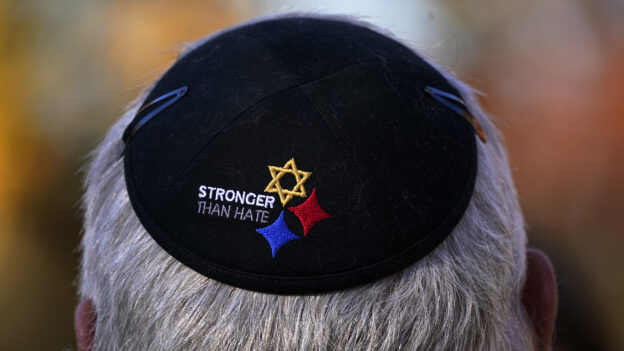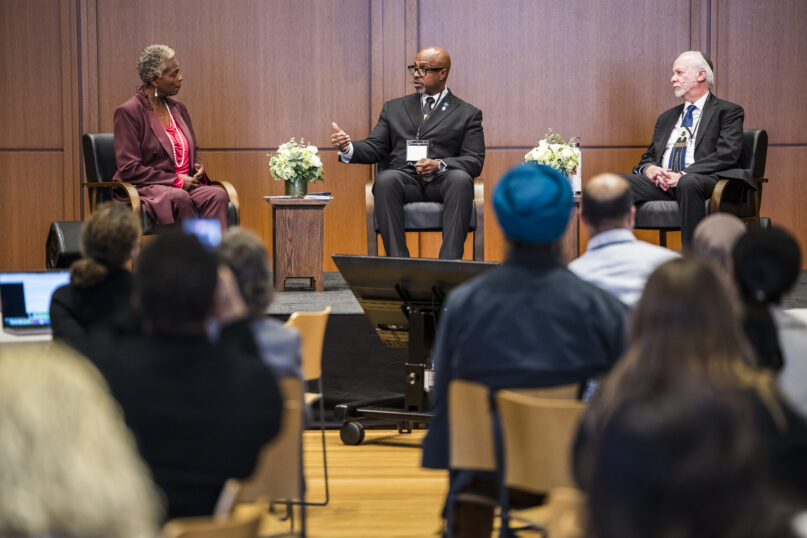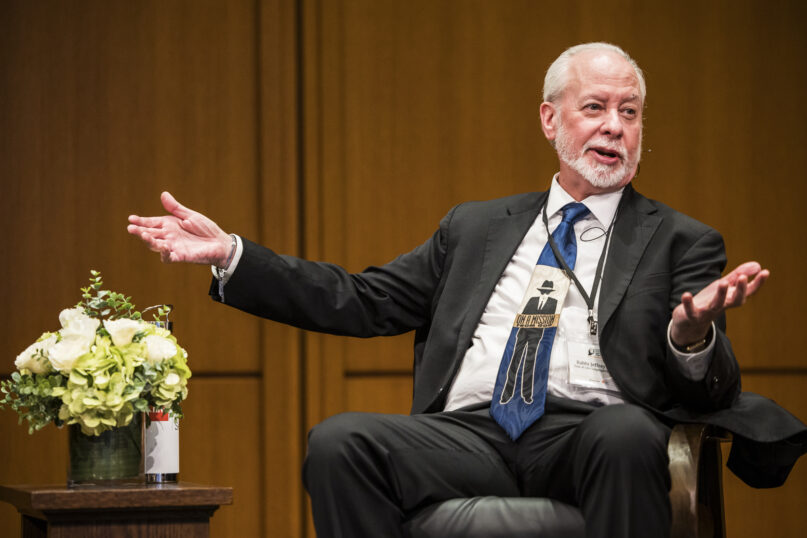
NEW YORK (RNS) — When the Rev. Eric Manning arrived in New York for a recent speaking engagement, a friendly face was waiting for him.
As he walked off the plane, there was his friend, Rabbi Hazzan Jeffrey Myers.
“Somebody might say, ‘it’s not a big deal,” said Manning. “It’s a big deal to me.”
Monday (Oct. 27) marks the seven-year anniversary of the mass shooting at Tree of Life Synagogue in Pittsburgh, where Myers is the rabbi and cantor. And this week marks the seventh anniversary of Myers’ and Manning’s unlikely friendship — one that has led both men to believe that love is stronger than the hate that seeks to divide us.
On Oct. 27, 2018, a gunman opened fire at Tree of Life, killing 11 members of the congregation — a day that still haunts Myers. A few days after the shooting, as Myers was sorting through the thousands of emails that came in after the tragedy, a message with the headline of Charleston popped up. He clicked on the email and found a message from Manning, the pastor of Mother Emanuel AME Church in Charleston, a congregation with its own history of tragedy.
Manning’s message was simple: I’m coming to town.
At first, Myers said, he was reluctant to respond, saying he did not have the energy to meet with one more stranger in the midst of trying to help his congregation cope with loss and grief. “Something told me, I need to sit down and meet with this man,” Myers told the audience at Religion News Service’s symposium “God, Government and the Algorithm: The New Rules of Belief and Power” at Trinity Commons in New York City on Wednesday (Oct. 22).

The Rev. Eric Manning, center, speaks on a panel with Rabbi Hazzan Jeffrey Myers, right, moderated by the Rev. Jacqui Lewis, left, during the 2025 RNS symposium at Trinity Commons, Wednesday, Oct. 22, 2025, in New York City. (Photo by Kisha Bari)
The two met for hours in a restaurant, sipping coffee and talking. It was a relief to speak with someone who knew what Myers and his congregation were going through.
“I learned this wonderful phrase called the ministry of presence,” Myers said.
Manning had become the pastor at Mother Emanuel in 2016, while the congregation was still reeling from the 2015 murder of nine church members of the historically Black congregation during a Wednesday evening Bible study. Among those killed by a white supremacist was the Reverend Clementa Pinckney, the church’s pastor, leaving a void that several short-term pastors had tried to fill.
When he arrived at Mother Emanuel, Manning said there was no road map for helping a congregation heal. He knew Myers might be overwhelmed and wanted to offer a listening ear and whatever help he could. The two men came from different faith traditions, but the challenge of leading a congregation in tragedy was the same.
Myers ended up inviting Manning to read the 23rd Psalm at the funeral for one of the members of Tree of Life and offer a few words, opening the door for a relationship between the two congregations.
When the trial came for the Tree of Life shooter, Manning was there, sitting beside Myers’ wife as the rabbi told the story of what he had experienced that day, with details he had never told in public before. It was a kindness the rabbi said he would never forget.

Rabbi Hazzan Jeffrey Myers addresses a symposium at Trinity Commons, Wednesday, Oct. 22, 2025, in New York City. (Photo by Kisha Bari)
“He sat and held my wife during the testimony. I couldn’t look at her. It was hard enough to get through the testimony,” he said. “I’ll be eternally grateful to this beautiful human being.”
At the symposium, held less than a week before the 7th anniversary of the Tree of Life attack, Myers recounted the shock and horror of watching the attack unfold. Many of those killed were older members who had arrived early for services.
“I couldn’t save them,” he said. “There were a few I hustled out of the front. But I was the last person to see them alive. I carry with me, for the rest of my life, survivor’s remorse.”
Myers said that he now feels a calling to help others heal from tragedy and to testify that there is still good in the world — even in the face of tragedy. He and Manning have reached out to faith leaders at other congregations affected by mass shootings and said they are always willing to pack a bag and go wherever there is a need.
“I have said before that when God calls, you don’t send God to voicemail,” Myers said. “Instead, you answer the call and do what God asks.”
During their talk, the two faith leaders asked reporters and other media to look for the good in the world. Manning asked what might happen if news outlets began the day with 90 seconds of good news, before launching into the bad.
“Pick up the story that someone met someone else along the way and showed them compassion when they didn’t have to,” he said. “How would that change our narrative?”
The faith leaders said that tragedy brought them together — but love kept them together. They said faith leaders — and other leaders — need to model the values they want to see in the world. And they hope their example will permit others to make similar friends and to show kindness.
They both believe there is more good in the world than evil — and that world events cannot shake their friendship.
Myers used a bit of humor to contrast the enduring power of spiritual values like love to the changing realities of politics. “The changing landscape of the world doesn’t impact the core values, which are hard and fast, because geopolitical currents change every day like undergarments,” he said. “They just change at will. But the core values stick.”
Manning agreed.
“What takes place in the world takes place in the world. I don’t know all the folks in the world, but I know him,” Manning said, pointing to Myers. “We are friends. We love each other.”
